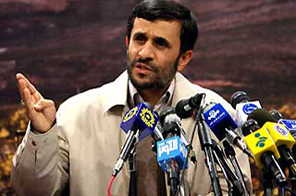Opposition mounts to Ahmadinejad
TEHRAN: Leading Iranian MPs voiced strong opposition on Monday to some of President Mahmoud Ahmadinejad's proposed ministers, including women, on the second day of a heated debate on his cabinet line-up.
Parliament is due to hold a vote of confidence on the 21-member cabinet on Wednesday but the hardline Ahmadinejad is battling to win support even from conservative MPs who complained about the inclusion of women and charged that many of his nominees lacked experience.
On Monday, MPs openly objected to one of the three women Ahmadinejad has picked, the first time in the 30-year history of the Islamic republic that Iran would have female cabinet ministers.
Education minister-designate Sousan Keshvaraz, dressed in a black chador, sought to win the support of a hostile parliament by showcasing her Islamic credentials and her plans for the post.
But the chairman of the parliamentary education committee, Ali Abbaspour, a powerful conservative, strongly opposed her candidacy.
"If Keshavarz gets the vote, then we have no choice but to impeach her," he warned. "She has only a year's experience... and is talking of the same programmes outlined by previous ministers. The president has to nominate a strong minister."
During Keshavarz's address, parliament speaker Ali Larijani had to tell MPs to stop talking and wandering about so that her voice could be heard.
The other two women nominees, Marzieh Vahid Dastjerdi at the health ministry and Fatemeh Ajorlou at welfare and social security, also lack ministerial experience and have come under fire from MPs and hardline clerics.
Reformist MP Mostafa Kavakebian lashed out at Foreign Minister Manouchehr Mottaki over Iran's foreign policy in the past four years, noting the "uncalled-for discussion of the Holocaust."
He also criticised financial aid handed to countries such as "Gambia and Bolivia," asking, "What good can these countries do to our economy and national interests?"
During Ahmadinejad's first four-year term, Iran has been increasingly isolated by an aggressive foreign policy dominated by its refusal to countenance any let-up in its controversial nuclear programme.
The president also hit the headlines for saying Israel was doomed to be "wiped off the map" and that the Holocaust was a "myth."
MPs are also divided over proposed intelligence minister Heydar Moslehi, who told parliament he would adopt "an aggressive approach... towards the enemies' soft and hard plots, and threats (against the Islamic regime)."
Moslehi has in the past served as the representative of supreme leader Ayatollah Ali Khamenei to the Revolutionary Guards and the Basij militia, which played a key role in stifling the post-election protests.
But MP Jamshid Ansari said: "He is inclined towards eliminating forces and he is not experienced enough for this ministry."
Ahmadinejad's nominations for interior minister -- current defence minister Mostafa Mohammad Najjar -- and oil minister -- current commerce minister Masoud Mirkazemi, have also met stiff opposition.
In all, six candidates spelt out their plans for their nominated posts before Monday's session ended for the day.
It is crucial for Ahmadinejad, who is already at loggerheads with members of his hardline support base, to win over the 220-member conservative bloc in the 290-seat parliament if his cabinet is to win the confidence vote.
According to the Iranian constitution, the cabinet needs the approval of more than 50 percent of MPs present for the vote.
But the president, whose hotly disputed re-election on June 12 set off the worst turmoil in Iran since the 1979 Islamic revolution, faces a daunting task to win over MPs.
Ahmadinejad, battling a sustained opposition campaign as well as disputes with his own supporters, urged parliament to approve his new cabinet on Sunday and said his election victory was confirmation that the people wanted his government to "continue on the same path."






